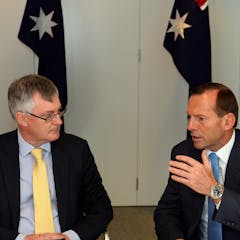
Articles on Political history
Displaying 141 - 160 of 231 articles

Those who do understand the Senate voting system have the potential to wield some influence both in its conduct and in debates about how it might be reformed.

In recent months the opposition has been on the policy front foot, but it’s a risky strategy that has had mixed success for both major parties.

Under new leader Barnaby Joyce, the Nationals – the most-successful minor party in Australia’s political history – will pretty much continue to be treated as the Akubra wing of the Liberals.

The principle underlying the ministerial standards is that ministers should uphold the public’s trust as they wield a great deal of power deriving from their public office.

As Australia’s special envoy for human rights, Philip Ruddock will have the chance to change the world instead of listening to other people make suggestions about how it might be done.

Australia’s inimitability with regard to women’s political equality has barely entered conventional studies of political history.

Only when systems change and cultural adjustments occur will the political class return to governing rather than ruling.

Alfred Deakin and his contemporaries invented the Australian prime ministership. But it was not settled as a platform for national leadership until John Curtin and Ben Chifley’s time.

Australians should want the reality of a republic. The rest is but window-dressing.

Governing was not meant to be easy. It never has been either.

Australian scholars have almost universally downplayed evidence for the ‘Ndrangheta’s existence or significance, or avoided the topic altogether.

Tony Abbott failed to read the signs of the times. His rhetoric was Churchillian, emphasising struggle, crisis and emergency.

The logic of the policy changes initiated by the Hawke government in mid-1990 has underpinned asylum-seeker policy for much of the quarter-century since.

There is little of Gareth Evans’ sweeping analysis in the cabinet papers of 1990-91 of a rapidly changing world order or of his vision of good international citizenship.

Kerry O'Brien has provided the platform for Paul Keating to define his political career, explain what drove his reform agenda and cement his position as one of Australia’s greatest leaders.

Australia’s Constitution sets the ground rules for its system of government. But many things one might expect to be in the Constitution are simply not there.

The story of German migration to South Australia can highlight the experience of diverse communities, and what can happen to them in a time of serious conflict.

If Anthony Albanese becomes Labor leader, Australians will have the strongest ideological and stylistic contrast in major party leaders since Malcolm Fraser and Bob Hawke 33 years before.

Debate, serious discussion and deliberation are valued highly in a democracy not just for their own sake, but because they are considered essential to testing the quality of ideas and arguments.

In the 1980s Australians grappled with the challenges of living in an era that brought together boom and crisis, nationalism and globalisation, confidence and anxiety, and conservatism and exuberance.
